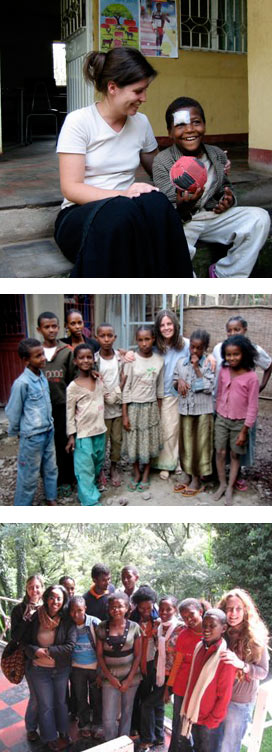Ethiopia is one of the poorest countries of the world. Already in 2004 it was home to 3.9 Million orphans. While many organizations are providing food, clothes and schooling for these children, vivo’s focus is on the psychosocial needs of these children to ensure their healthy mental development. Back in spring 2006 vivo interviewed more than 100 children orphaned due to HIV/AIDS living in Awassa, in Southern Ethiopia. Beside symptoms of grief, many children living in so-called foster families were suffering from ongoing maltreatment and were exploited by their foster families as servants. Therefore additionally to the implementation of trauma and grief counselling structures for orphans, vivo also engaged in awareness raising activities against child abuse and maltreatment in the community and provided training for local counsellors, grandparents and foster families on ‘positive parenting’.
vivo also opened a small orphanage for eight severely maltreated children aiming to give them a peaceful and loving home. Sintahyu, a woman from the local community became the pillar on which the whole structure came to rest. She fully engaged herself as the maternal caregiver for the last four and a half years. The success of this project is amazing! All children living in the vivo-house for the past four and a half years have changed in a fundamental way. Eight formerly shy and depressed, partly suicidal children today constitute a healthy and happy family of ‘sisters and brothers’, addressing their caretaker as ‘mummy’. Children’s anecdotal reports, their outstanding scholastic achievements as well as clinical diagnosis confirmed that they are well on the path to finally live a normal childhood and adolescence.
At the same time they have not forgotten about their past experiences, all of them are actively engaged in so-called ‘Anti-AIDS-Clubs’ and awareness raising activities; such as writing dramas about experiences of domestic violence in their own lives and performing them proudly on public stages in their communities. The oldest girl of the housing project started University in October 2010 in Harar but still feels close to her ‘sisters and brothers’ and visits her home whenever possible.
Ethiopia is one of the poorest countries of the world. Already in 2004 it was home to 3.9 Million orphans. While many organizations are providing food, clothes and schooling for these children, vivo’s focus is on the psychosocial needs of these children to ensure their healthy mental development. Back in spring 2006 vivo interviewed more than 100 children orphaned due to HIV/AIDS living in Awassa, in Southern Ethiopia. Beside symptoms of grief, many children living in so-called foster families were suffering from ongoing maltreatment and were exploited by their foster families as servants. Therefore additionally to the implementation of trauma and grief counselling structures for orphans, vivo also engaged in awareness raising activities against child abuse and maltreatment in the community and provided training for local counsellors, grandparents and foster families on ‘positive parenting’.
vivo also opened a small orphanage for eight severely maltreated children aiming to give them a peaceful and loving home. Sintahyu, a woman from the local community became the pillar on which the whole structure came to rest. She fully engaged herself as the maternal caregiver for the last four and a half years. The success of this project is amazing! All children living in the vivo-house for the past four and a half years have changed in a fundamental way. Eight formerly shy and depressed, partly suicidal children today constitute a healthy and happy family of ‘sisters and brothers’, addressing their caretaker as ‘mummy’. Children’s anecdotal reports, their outstanding scholastic achievements as well as clinical diagnosis confirmed that they are well on the path to finally live a normal childhood and adolescence.
At the same time they have not forgotten about their past experiences, all of them are actively engaged in so-called ‘Anti-AIDS-Clubs’ and awareness raising activities; such as writing dramas about experiences of domestic violence in their own lives and performing them proudly on public stages in their communities. The oldest girl of the housing project started University in October 2010 in Harar but still feels close to her ‘sisters and brothers’ and visits her home whenever possible.


